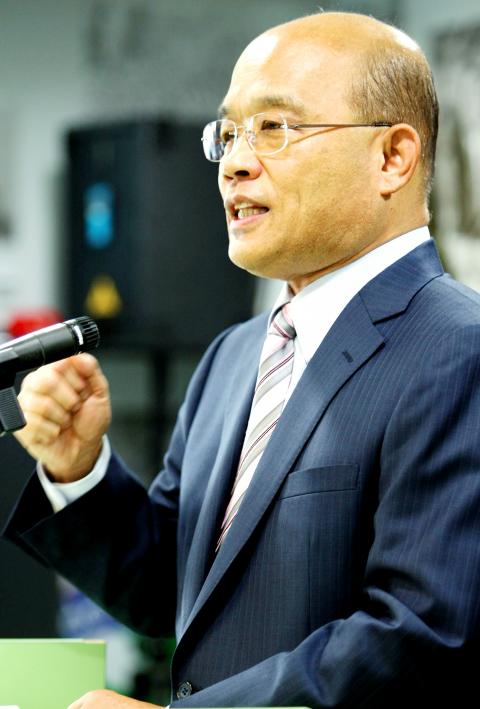Former premier Su Tseng-chang (蘇貞昌) and former vice premier Wu Rong-i (吳榮義) registered for the Democratic Progressive Party (DPP) chairperson election yesterday, with the favored lead, Su, saying he would make the DPP “a larger and better party that meets people’s expectations” if he is elected.
It was also confirmed that the May 27 election would be a five-way race and the most competitive chairperson election in the party’s 26-year history, after former DPP chairperson Hsu Hsin-liang (許信良) and former DPP lawmaker Chai Trong-rong (蔡同榮) both said yesterday that they would complete their registration tomorrow.
Former Tainan County commissioner Su Huan-chih (蘇煥智) was the first to register on Monday.

Photo: CNA
However, Su Tseng-chang is seen by analysts and party members as the strongest candidate.
His appeal could be seen during his post-registration press conference, which attracted more than 50 reporters and almost 30 camerapeople, a level of media attention usually only seen around presidential candidates.
Su Tseng-chang, 64, spoke of his strong identification with the party as one of its 18 founding members, as well as his “never-fading passion” over the past 31 years for the party and its role in improving Taiwanese politics.
Su Tseng-chang maintained his moderate position on China policy, saying that the DPP should engage Beijing actively and confidently, and that it could not afford to deal with a rapidly changing China with a rigid mindset.
“The DPP should better understand not only the present and economic aspects of China, but also the future and non-economic aspects, and understand it from the perspective of ordinary people as well,” he said.
“We have to replace opposition with dialogue and seek co-existence and mutual benefits through better interaction,” he added.
The seven-in-one elections in 2014 will be the biggest elections in Taiwan’s history and one of the most important tasks for the next DPP chairperson, who will have to work the grassroots level diligently for fruitful results, he said.
Su Tseng-chang described President Ma Ying-jeou (馬英九) as a leader who “fails to hear the voice of the people and rules with arrogance,” and said Taiwanese “expect to see a powerful DPP to check and balance the ruling party.”
“That would require more than one person, one group of people or even the might the DPP possesses now,” he said, adding that is why the party needs to reform and transform into an inclusive party, seeking all possible support from the young generation, previous members and local politicians.
Wu said in his post-registration press conference that participation in the election would be “the greatest glory” of his life and he would be able to help the DPP with his expertise in economics.
Hsu, the latest candidate to express an interest in running, met with former DPP chairperson Tsai Ing-wen (蔡英文) yesterday, and received Tsai’s blessings and praise for his experience and innovative ideas.
Chai was set to announce his bid at a press conference today.

Taipei has once again made it to the top 100 in Oxford Economics’ Global Cities Index 2025 report, moving up five places from last year to 60. The annual index, which was published last month, evaluated 1,000 of the most populated metropolises based on five indices — economics, human capital, quality of life, environment and governance. New York maintained its top spot this year, placing first in the economics index thanks to the strength of its vibrant financial industry and economic stability. Taipei ranked 263rd in economics, 44th in human capital, 15th in quality of life, 284th for environment and 75th in governance,

Greenpeace yesterday said that it is to appeal a decision last month by the Taipei High Administrative Court to dismiss its 2021 lawsuit against the Ministry of Economic Affairs over “loose” regulations governing major corporate electricity consumers. The climate-related lawsuit — the first of its kind in Taiwan — sought to require the government to enforce higher green energy thresholds on major corporations to reduce emissions in light of climate change and an uptick in extreme weather. The suit, filed by Greenpeace East Asia, the Environmental Jurists Association and four individual plaintiffs, was dismissed on May 8 following four years of litigation. The

A former officer in China’s People’s Liberation Army (PLA) who witnessed the aftermath of the 1989 Tiananmen Square massacre has warned that Taiwan could face a similar fate if China attempts to unify the country by force. Li Xiaoming (李曉明), who was deployed to Beijing as a junior officer during the crackdown, said Taiwanese people should study the massacre carefully, because it offers a glimpse of what Beijing is willing to do to suppress dissent. “What happened in Tiananmen Square could happen in Taiwan too,” Li told CNA in a May 22 interview, ahead of the massacre’s 36th anniversary. “If Taiwanese students or

The New Taipei City Government would assist relatives of those killed or injured in last month’s car-ramming incident in Sansia District (三峽) to secure compensation, Mayor Hou You-yi (侯友宜) said yesterday, two days after the driver died in a hospital. “The city government will do its best to help the relatives of the car crash incident seek compensation,” Hou said. The mayor also said that the city’s Legal Affairs, Education and Social Welfare departments have established a joint mechanism to “provide coordinated assistance” to victims and their families. Three people were killed and 12 injured when a car plowed into schoolchildren and their